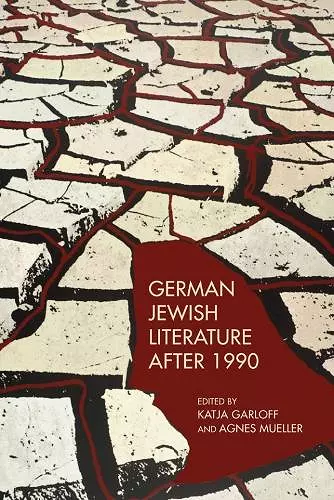German Jewish Literature after 1990
Professor Agnes Mueller editor Professor Katja Garloff editor
Format:Hardback
Publisher:Boydell & Brewer Ltd
Published:28th Sep '18
Currently unavailable, and unfortunately no date known when it will be back

Edited volume tracing the development of a new generation of German Jewish writers, offering fresh interpretations of individual works, and probing the very concept of "German Jewish literature." The 1990 reunification of Germany gave rise to a new generation of writers who write in German, identify as both German and Jewish, and often also sustain cultural affiliations with places such as Russia, Azerbaijan, or Israel. This edited volume traces the development of this new literature into the present, offers fresh interpretations of individual works, and probes the very concept of "German Jewish literature." A central theme is the transformation ofmemory at a time when the Holocaust is moving into greater historical distance while the influx of new immigrant groups to Germany brings other past trauma into view. The volume's ten original essays by scholars from Europe and the US reframe the debates about Holocaust memory and contemporary German culture. The concluding interviews with authors Mirna Funk and Olga Grjasnowa offer a glimpse into the future of German Jewish literature. Contributors: Luisa Banki, Caspar Battegay, Helen Finch, Mirna Funk, Katja Garloff, Olga Grjasnowa, Elizabeth Loentz, Andree Michaelis-König, Agnes Mueller, Jessica Ortner, Jonathan Skolnik, Stuart Taberner. Katja Garloff is Professor of German and Humanities at Reed College. Agnes Mueller is the College of Arts & Sciences Distinguished Professor of the Humanities at the University of South Carolina.
[O]ffers a remarkably broad and diverse overview of recent developments in German Jewish discourse and features high-quality articles that indicate where German Jewish writing might be headed over the next couple of years. . . . [E]ssential reading for all those wishing to acquaint themselves with the latest trends in contemporary German Jewish discourse, particularly in relation to the Eastern European turn and the so-called third generation. It promises to reinvigorate debates about German Jewish writing, and it is to be hoped that it will give rise to many more exciting research and publication projects. -- Maria Roca Lizarazu * MODERN LANGUAGE REVIEW *
[A] stellar volume, which will have a great impact on scholarship not only in German Jewish studies, but also memory studies, narrative studies, and migration studies. . . . [T]he essays are suitable for use in advanced undergraduate or graduate seminars and would dovetail nicely in seminars that take up the primary texts in German or in English translation. -- Karen Remmler * GERMAN QUARTERLY *
The 'value added' of this carefully edited volume lies in its steering of attention toward until now less-noticed authors of the third generation ([including] Olga Grjasnowa, Mirna Funk, Vladimir Vertlib, Alina Bronsky, Katja Petrowskaja, Oliver Polack, and Benjamin Stein), without neglecting characteristic voices of the first and second generations since 1990. -- Hans Otto Horch * GERMANISTIK *
The theme common to most of these essays is whether the Holocaust is still the defining event of German-Jewish memory -- whether the Holocaust can fade. The volume is handsomely edited, all significant German passages are translated, and the bibliography is bilingual. . . . Recommended. Upper-division undergraduates through faculty; general readers. -- S. Gittleman * CHOICE *
ISBN: 9781640140219
Dimensions: unknown
Weight: 556g
272 pages